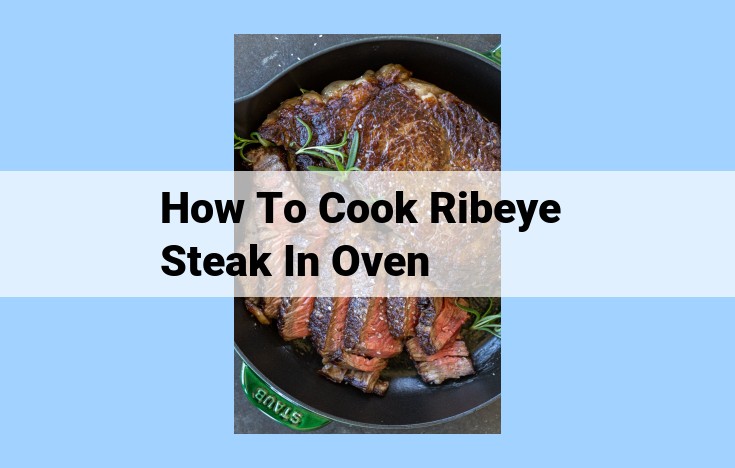Perfect Ribeye Steaks: A Step-By-Step Guide To Sear And Roast

- Preheat oven to 450°F (230°C). Season ribeye steaks with salt and pepper. 2. Sear steaks in a hot skillet for 2 minutes per side to brown. 3. Transfer steaks to a wire rack set over a baking sheet. 4. Roast for 15-20 minutes or until desired doneness is reached. 5. Rest steaks for 10 minutes before slicing and serving.
Essential Elements of Cooking: A Comprehensive Guide to Unleash Your Culinary Potential
In the culinary realm, where passion and precision intertwine, a few essential elements lay the groundwork for extraordinary creations. Let’s embark on a delectable journey to explore these fundamentals, igniting your inner chef and transforming everyday meals into culinary masterpieces.
Ingredients: The Foundation of Flavor
The choice of ingredients sets the stage for a symphony of flavors. High-quality, fresh produce bursts with vibrant colors and crisp textures, while premium meats and seafood offer a depth of richness. When selecting ingredients, seek seasonal fruits and vegetables at their peak of freshness and support local farmers whenever possible. Read food labels carefully to ensure the absence of unwanted additives or preservatives.
Equipment: Your Culinary Tools of Trade
Equip your kitchen with a curated arsenal of tools designed to elevate your culinary prowess. A sharp chef’s knife becomes an extension of your hand, effortlessly gliding through ingredients with precision. Various types of cooking equipment, from sauté pans to Dutch ovens, allow you to execute a range of cooking methods with ease. Invest in well-made, durable equipment that will withstand the rigors of daily use and inspire culinary exploration.
Cooking Methods: Mastering the Art of Heat
The application of heat is the transformative key that unlocks the flavors and textures of food. Understanding different cooking methods empowers you to achieve specific results. Sautéing infuses a crispy exterior with a tender interior, while braising gently simmers meats and vegetables in a flavorful liquid, creating a melt-in-your-mouth experience. Experiment with various roasting, steaming, and grilling techniques to create a diverse culinary repertoire.
Cooking Styles: A Culinary Journey Around the World
Cultures across the globe have shaped distinct cooking styles that reflect their traditions and unique ingredients. Embark on a culinary adventure by exploring the vibrant flavors of Indian, Thai, Italian, and French cuisines. Each style offers an enchanting blend of spices, herbs, and cooking techniques that will tantalize your taste buds and expand your culinary horizons.
Essential Techniques: The Cornerstone of Culinary Success
Beyond ingredients and equipment, a set of essential cooking techniques provides the foundation for mastering the craft. Knife skills are paramount, enabling you to prepare ingredients with precision and efficiency. Heat control is crucial for achieving the desired doneness and preserving the delicate flavors of certain foods. Seasoning is the art of balancing flavors, adding depth and complexity to any dish with a sprinkle of herbs, a dash of salt, or a drizzle of olive oil.
By embracing these essential elements of cooking, you unlock the gateway to a world of culinary possibilities. Let your passion and curiosity guide you as you experiment with new flavors, techniques, and styles. With each dish you create, you embark on a culinary adventure that nourishes both your body and soul.
Complementary Concepts for Enhanced Cooking
Enhancing your culinary skills goes beyond mastering essential elements like ingredients, equipment, and techniques. Embracing a holistic approach to cooking involves delving into additional concepts that complement the core aspects and elevate your cooking experience.
Food Safety and Sanitation: The Foundation of Healthy Cuisine
Ensuring food safety is paramount, safeguarding your health and the well-being of those you cook for. Understanding proper food handling, sanitation practices, and the danger zone for food storage is crucial to prevent foodborne illnesses.
Nutritional Considerations: Nourishing Your Body
Cooking should not only be about taste but also about nutritional value. Consider the health implications of ingredients and incorporate fruits, vegetables, whole grains, and lean proteins to create balanced meals that nourish your body while tantalizing your taste buds.
Plate Presentation and Food Styling: A Feast for the Eyes
The adage “we eat with our eyes first” holds true. Plate presentation is an art form that transforms a meal into a visual masterpiece. By styling and arranging food creatively, you enhance its aesthetic appeal and create a memorable dining experience.
Sensory Evaluation and Tasting: Engage Your Palate
Honing your sensory skills allows you to critically evaluate food textures, flavors, and aromas. Tasting thoughtfully develops your palate and enables you to discern subtle nuances, helping you refine your cooking techniques and create dishes that captivate the senses.
Food Trends and Innovations: Embracing Culinary Evolution
The culinary world is constantly evolving, with food trends and innovations emerging regularly. Stay informed about novel ingredients, cutting-edge techniques, and creative culinary concepts to expand your culinary horizons and keep your cooking experience fresh and exciting.